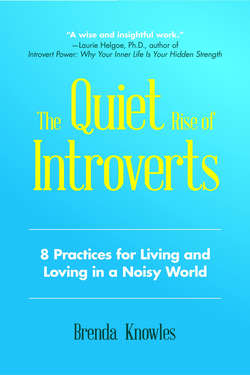Читать книгу The Quiet Rise of Introverts - Brenda Knowles - Страница 8
На сайте Литреса книга снята с продажи.
ОглавлениеIf you are most comfortable dwelling in your inner world, exploring thoughts, ideas and feelings, then integrating relationships into your life can be a challenging and scary prospect. You feel safe in solitude. You recharge best alone; yet, you want closeness, companionship, and love.
Many introverts struggle to find the energy and courage to engage in the swirl of socializing and the responsibilities of relationships. Those who do enter into relationships often find themselves choosing between their need for space and their partner’s need for intimacy.
What if, as an introvert, you could maintain the natural inclinations of your personality and develop meaningful relationships? What if there was a guide to move you through a maturity continuum that could result in a balance of inner satisfaction and outer connection?
The eight practices found in this book serve as that guide. A progression of awareness and action steps will help you move past the anxiety and stress of living an ill-fitting extroverted life, through the important but insufficient goals of independence and self-reliance, and to the secure and fulfilling state of authenticity and deep connection with others.
The intention of this book is not to turn introverts into extroverts.
The intention is to teach introverts how to be both pro-self and pro-relationship. Pro-self, meaning that we have a good grasp of personal values, personality traits, past wounds, and the bravery necessary to advocate for all of them. Pro-self does not mean placing blame on others. For example, “He never listens and it is destroying our marriage,” puts the onus on one partner. That statement is not pro-self. A mature and pro-relationship stance would look like, “We have trouble listening to and understanding each other. It is taking a toll on our marriage.”
I AM WITH YOU
As an introvert and highly sensitive person, I understand the need for non-critical, nonjudgmental support and encouragement. I know the intimate fears and perceived inferiority of the introverted individual.
I spent many hours playing by myself in my room as a child, while my extroverted sister sought and received attention from my parents. I obtained a business degree and forced my quietly observant personality to become vocally active in corporate America. I married an extroverted and aggressive man to help navigate the bold and busy world.
At age thirty-five, I began listening to my internal voice. I started giving it credence. I began to value my introverted nature rather than suppress it to keep up outgoing and energized appearances. At age forty-two, I found myself divorced and back in the dating world.
The divorce and my newfound appreciation for my inner world served as catalysts for my deep dive into research and writing regarding relationships and temperaments.
As a personal and relationship coach, as well as a longtime writer and researcher on the subject of the deeply introspective and sensitive lifestyle, I learn and share along with my clients and readers. I have experienced the life-changing benefits of growth-fostering relationships.
One question I asked myself post-divorce, and one you might consider as an introvert is, “Is it more satisfying to be independent or interdependent?”
GROWTH AND MATURITY LEADING TO CONTENTMENT
In personal growth, there is a maturity continuum. This continuum moves us from dependence on others to independence and reliance on ourselves, and to interdependence or a balanced state of self within relationships.
Independence exists within interdependence; therefore, it is possible to experience the fulfilling interaction of the two. We can honor our autonomy (as introverts love to do) and honor the warmth of healthy relationships as well.
